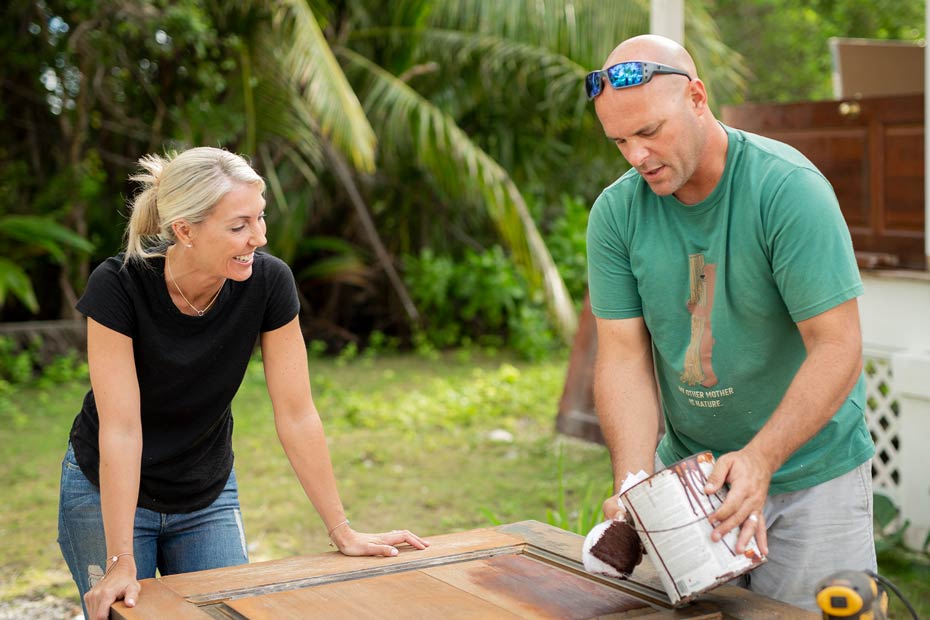Published June 13, 2019 • 6 Min Read
Financing the growth of your business can seem like a big challenge. Preparing your company for the next stage — whether it’s new equipment, more staff, an expanded space or additional inventory — may take more money than what you have on hand.
While financing large projects was nothing new for the Baeumlers, tackling the renovation of a boutique resort in the Bahamas, as seen on HGTV Canada’s Island of Bryan, was a whole new beast. Here’s how they handled the challenges that came with financing their bold new project.
“With the scale of the project, we ran into a few cash flow snags that impacted our overall construction budget,” says Bryan.
“Being flexible is key, and re-examining what would work not only for our short construction needs but also our long-term development needs has been a fluid and continuous process. The goal has always been to work with our advisors to make sure that our financial decisions are made with a focus on attempting to mitigate risk while also leveraging cashflow needed at the various stages of this project.”
So how do you finance growth when your business is ready to move to the next level? Business owners and HGTV Canada stars Bryan and Sarah Baeumler have some tips for owners looking to scale up, expand or branch out — along with Senior Director of Business Strategy at RBC Karen Svendsen who weighs in with advice and insights from a financial perspective.
Here, the Baeumlers and RBC team up to answer common questions for growing businesses.
What are some typical ways a small business can finance the growth of their company?
“Financing the growth of your business can seem like an insurmountable challenge,” says Bryan Baeumler. “But it doesn’t have to be. There are lots of options available.”
Karen Svendsen highlights two typical ways a company will fund growth: “The first is by looking at outside investors, which can range from government agencies to professional parties or friends and family. The second is bank financing — everything from short-term vehicles like overdraft protection through to lines of credit, business loans, and commercial leasing and mortgages,” she says.
How would an owner choose a financing solution for their specific needs?
According to Karen, there are a number of bank financing options, and which one you choose really comes down to what you are trying to finance. For instance, an operating line of credit or overdraft is appropriate to cover short-term gaps in your cash flow as you can draw from those vehicles as you need.
On the other hand, if you’re financing a piece of equipment or asset for your business, a term loan or commercial mortgage is more suited. “I always caution against putting a big-ticket item on an operating line of credit, as it will chew up a large portion of a line that’s designed for cash flow support. And, six years later that debt might still be hanging around for an asset that’s worth less than the amount you owe,” she advises.
What other options are out there for financing growth?
“Another option is to look for outside investors,” says Bryan. You may have to give up some control or a bit of equity, but that does bring some cash in to grow your business.”
Adds Karen: “Investors can be really helpful if you are growing at a very high rate, making your risk picture beyond what a bank is typically comfortable with. Investors can lend more money, although it’s often at a rate higher than what a bank would provide.”
So when looking at investor support, what should an owner look for?
When an owner is considering getting funds from an outside investor, there are a few questions to ask. What role does the investor want to have? What is the rate of return they are willing to provide? If they’re looking to invest in the company, are you willing to give up any ownership? What kind of voice does the investor expect to have? Are you at risk of giving up strategic control?
As you weigh your options for investor support, consider what you want the investor for — is it to cover debt, provide equity or offer mentorship? For instance some investors — particularly those in the same industry as your company — will want to keep a hand in the business and mentor the next generation. “Keep in mind,” says Karen, “some investors can offer not just a means to grow your business but a way to grow your business skills and knowledge at the same time.”
What are banks looking for when considering extending financing to a business?
“A bank will ask about the purpose of the funds, Karen says. “Will they be used to finance ongoing business expenses or to purchase a tangible asset? If it’s to acquire an asset, the bank will want to know how that asset will contribute to the growth of the business.”
A bank will also look at what kind of cash flow the business has. Is it positive? Can you reliably make your loan payments without affecting your business’ ability to grow, or will you be starving your growth because you’ll be obligated to make payments? To that end, a lender will also look at where the payments are coming from, and what security there would be to support the financing.
What should a business owner be thinking about before taking funds — whether it’s from a bank or an investor?
“Owners should take a close look at their business, how it’s performing, how it’s trending, and where the next generation of growth will come from,” Karen advises. As an example, money all by itself without an understanding of where you’re going to sell could leave you with excess inventory. It’s important that you know what is driving your growth — i.e., is it from gaining more customers or getting more from your existing customers? Is it by changing your business model or diversifying your output?
Sometimes you need to borrow before you start seeing sales growth, which means sometimes you need to invest to create a new line. In any case, you still need to have a clear vision of how the borrowed funds will contribute to the growth of your business.
While the Baeumlers are busy with their adventure renovating a boutique resort hotel on South Andros Island in the Bahamas, here’s what they have to say about growing their business and the lessons learned along the way:
[embed-video src=”https://www.youtube.com/embed/G3G0Y1vDNlk?rel=0″]
This article is intended as general information only and is not to be relied upon as constituting legal, financial or other professional advice. A professional advisor should be consulted regarding your specific situation. Information presented is believed to be factual and up-to-date but we do not guarantee its accuracy and it should not be regarded as a complete analysis of the subjects discussed. All expressions of opinion reflect the judgment of the authors as of the date of publication and are subject to change. No endorsement of any third parties or their advice, opinions, information, products or services is expressly given or implied by Royal Bank of Canada or any of its affiliates.
Share This Article






